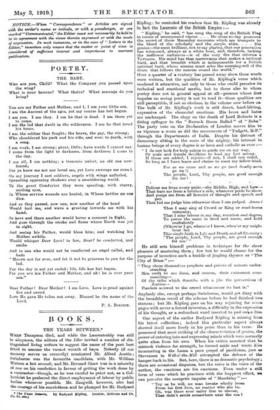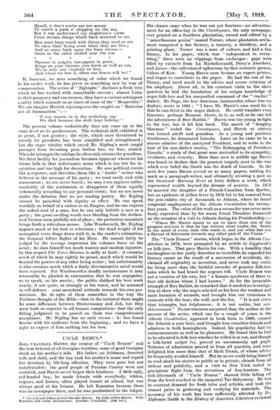BOOKS.
THE YEARS BETWEEN.* Witte Tennyson died, and while the Laureateship was still in abeyance, the editors of the Idler invited a number of dis- tinguished living writers to suggest the name of the poet beet fitted to assume the vacant wreath of bays. Nobody (if our memory serves us correctly) nominated Mr. Alfred Austin ; Swinburms was the favourite candidate, with Mr. William Watson a hot second; and Mr. Bernard Shaw was in a minority of one on his resolution in favour of getting the work done by a contractor—though, as he was careful to point out, as a Col- lectivist he preferred the direct employment of labour by public bodies wherever possible. Mr. Zangwill, however, also had the courage of his convictions. and he plumped for Mr. Rudyard • The U4wadYaw.B.teas, Ity Budyard Yipil g. Lando.; Methuen and Ce.
Kipling : he reminded his readers that Mr. Kipling was already in fact the Laureate of the British Empire:-
Kipling,"he said. " has sung the song of the British Flag in verses of unsurpassed vigour. . . . He alone today possesses the secret of those Macaulay measures which are trumpets to the blood of the scholarly and the simple alike. . . His genius—the most brilliant, not to say glaring, that our generation has witnessed, always at a white heat, and, therefore, looking the mellower radiances—is of the very fire that informs a Tyrtaeus. His mind has that narrowness that makes a national bard, and that breadth which is indispensable for a British national bard, whose strains must echo the morning-roll of the drum that follows the sunrise round the world."
Over a quarter of a century has passed away since these words were written, but the qualities of Mr. Kipling's verse which rendered it attractive, not only to those who could perceive its technical and emotional merits, but to those also to whom poetry does not in general appeal at all—persons whose first impulse on seeing poetry is not to read it—these qualities are still perceptible, if not so obvious, in the volume now before us. The bulk of Mr. Kipling's work is still direct, hard-hitting, expressive of the elemental emotions. His loves and bates are unchanged. The elegy on the death of Lord Roberta is a fitting epilogue to the " Barrack Room Ballad " of " Bobs." The party vote on the Declaration of London moves him to as vigorous a scorn as did the movements of "Padgett, M.P." through the Departments of India. Despite his distrust of democracy sitting in the seats of the mighty, his interest in human beings of every degree is as keen and catholic as ever :—
I do not look for holy eaints to guide use on my way, Or male and female devilkins to lead my foot astray. If these are added, I rejoice—if not, I shall not mind, So long as I have leave and choice to meet my fellow-kind.
For as. w. !
we and as we go (and deadly-soon go The people, Lord, Thy people, are good enough for me • • • • • • Deliver me from every pride—the Middle, High, and Low-- That bars me from a brother's side, whatever pride he show. And purge me from all heresies of thought and speech and That bid me judge him otherwise than I am judged. Amen t That I may sing of Crowd or King or road-borne company, That I may labour in my day, vocation and degree, To prove the same in deed and name, and hold unshakeuly (Where'er I go, whate'er I know, whoe'er my neigh. bour be) This single faith in Life and Death and all Eternity : ' The people, Lord, Thy people, are good enough for me.' " He still sets himself problems in technique for the sheer pleasure of mastering them ; few but he would choose for the purpose of invective such a huddle of jingling rhymes as "The City of Brass " :— "They chose themselves prophets and priests of minute under. standing
Men swift to seo done, and outrun, their extromest com- manding— Of the tribe which describe with a jibe the perversions of Justice—
Panders avowed to the crowd whatsoever its lust is." Anybody else, except perhaps Sainburne, would get dizzy with the breathless recoil of the scheme before he had finished two stanzas ; but Mr. Kipling goes on his way rejoicing for seven pages with never a forced inversion, a difficulty in the expression of his thought, or a redundant word inserted to pad outaa line.
One aspect of the earlier Rudyard Kipling is missing from his latest collection; indeed this particular aspect always showed itself more freely in his prose than in his verse. He possessed that most striking of the characteristics of genius, the power of entering into and expressing minds which were normally quite alien from his own. When his critics asserted that he mistook violence for strength, he turned aside and wrote Kim incarnating in the Lama a pure gospel of pacificism, just as Stevenson in Will-o'-the•Mill attempted the defence of the hanger-back in life. But, here, there is no dramatis psychology ; there are occasional disguises, but the voice is the voice of the author, the emotions are his emotions. Even under a still form of verse which he practises with the happiest effect, we can perceive the energetic impulse of " Mandalay "
" Try as he will, no man breaks wholly loose From his first love, no matter who she be.
Oh, was there ever sailor free to choose,
That didn't settle somewhere near the sea 7
Myself, it don't excite me nor amuse .
To watch a pack o' shipping on the sea. But I can understand my neighbour's views From certain things which have occurred to me. Men must keep touch with thins they used to use To earn their living even when they are free ; And so come back upon the least excuse— Same as the sailor settled near the sea.
• • Parsons in pulpits, tax-payers in pews,
Kings on your thrones, you know as well as me, We ve only one virginity to lose,
Aud where we lose it, there our hearts will be! "
if, however, we miss something of value which we found in his earlier work, he has given us something new by way of compensation. The series of " Epitaphs " discloses a fresh vein which he has worked with remarkable success ; almost Latin in their pungency and conciseness, they have a curious astringent quality which reminds us at times of some of the " Hesperides." We can imagine Herrick rejoicing over the couplet on " Batteries out of Ammunition" If any mourn its in the workshop, say We died because the shift kept holiday."
The present volume undoubtedly does not come up to the nine level as its predecessors. The technical skill exhibited is as great, if not greater ; the style, which once threatened to parody its parodists, has been simplified and strengthened ; but the eager vitality which saved Mr. Kipling's most turgid passages from becoming pure bathos has, we fear, abated. When he attempts the sublime he often only attains the grandiose. His fatal facility for journalism becomes apparent whenever his theme falls in that unfortunate mean which is too low for in- spiration and too high for decoration. He sees political events like a reporter, and describes them like a " leader "-writer who believes in the message of his patty; we read easily and with amusement ; we are never bored ; we may even approve enthu- siastically of the sentiments or disapprove of them equally vehemently according to our personal creed ; but we are never under the delusion that we arc reading poetry. Mr. Kipling cannot be parochial with dignity or effect. He can speak worthily on behalf of a nation or an Empire, and he can express the naked soul of a man, but he can only belittle a sect or a party ; the great swelling words torn bleeding from the Author- ized Version seem pitifully out of place ; the parturient mountain brings forth a ridiculous mouse. Like Wordsworth, Mr. Kipling appears much at his best in selections ; the dead weight of his uninspired verse drags down with it, in the reader's estimation, the frequent loftier flights of his Muse. He cannot fairly be judged by the average impression his volumes leave on the mind ; he does himself too much wanton and random injustice. In this respect The Years Between is sadly at fault : it contains much of which he may rightly be proud, much which would be beyond the powers of any other living writer ; but unfortunately it also contains much which a finely discriminative mind would have rejected. For Wordsworth's deadly inclusiveness it may reasonably be pleaded in extenuation that he was unpopular, so to speak, on his merits ; the public disliked his best work nearly, if not quite, as strongly as his worst, and he assumed in self-defence semi-sacerdotal attitude towards his own pro- ductions. He thought of them somewhat in the way the Puritans thought of the Bible—that to the initiated there might be some difference between Deuteronomy and Job, but they were both so superior to all human compositions that the only fitting, judgment to be passed on 1 hem was comprehensive acceptance. Mr. Kipling has no such excuse : he has found favour with his audience from the beginning ; and we have a sight to expect of him nothing but his best.



































 Previous page
Previous page